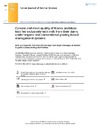Identificador persistente para citar o vincular este elemento:
https://accedacris.ulpgc.es/jspui/handle/10553/69976
| Título: | Carcase and meat quality of Blanca Andaluza kids fed exclusively with milk from their dams under organic and conventional grazing-based management systems | Autores/as: | Guzmán, José Luis De-La-Vega, Francisco Angel Zarazaga, Luis Argüello Henríquez, Anastasio Delgado-Pertíñez, Manuel |
Clasificación UNESCO: | 330921 Alimentos proteínicos | Palabras clave: | Goat Kid Organic Production System Sex |
Fecha de publicación: | 2019 | Publicación seriada: | Italian Journal of Animal Science | Resumen: | The number of organic farms is growing, but switching from conventional to organic production requires farms continue to produce high quality products. This study compares the carcase and meat quality of Blanca Andaluza goat suckling kids raised under organic and conventional grazing-based stock raising production systems. Twenty-four twin kids (12 males, 12 females) were selected from representative farms of each system. Body weight, dressing percentage, carcase linear measurements, non-carcase components, primary carcase and minor cuts, tissue composition, chemical composition and rheological variables, pH and colorimetric variables, were examined. No significant differences were seen between the production systems or sex with respect to most of the variables studied. However, some non-carcase components and colorimetric variables were affected, with the organic kids' meat returning lower values for lightness, yellow index, chroma and Hue angle. Indeed, some of the meat colour variables examined easily discriminated between the animals raised under the different production systems. These results show that conventional grazing–based farms raising these goats could easily turn to organic production without carcase or meat quality being affected.Highlights Organic farms are growing in number. The transformation to organic kid-raising is easy, with meat quality unaffected. These results are of interest with respect to the viability of conventional goat farms. | URI: | https://accedacris.ulpgc.es/handle/10553/69976 | ISSN: | 1594-4077 | DOI: | 10.1080/1828051X.2019.1638317 | Fuente: | Italian Journal of Animal Science [ISSN 1594-4077], v. 18 (1), p. 1186-1191 |
| Colección: | Artículos |
Citas SCOPUSTM
6
actualizado el 08-jun-2025
Citas de WEB OF SCIENCETM
Citations
6
actualizado el 25-ene-2026
Visitas
51
actualizado el 10-ene-2026
Descargas
63
actualizado el 10-ene-2026
Google ScholarTM
Verifica
Altmetric
Comparte
Exporta metadatos
Los elementos en ULPGC accedaCRIS están protegidos por derechos de autor con todos los derechos reservados, a menos que se indique lo contrario.
